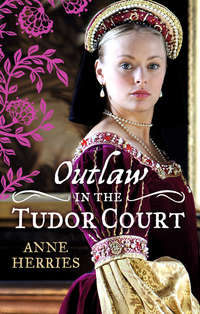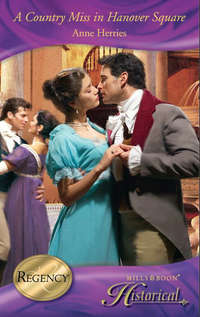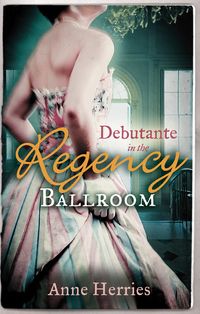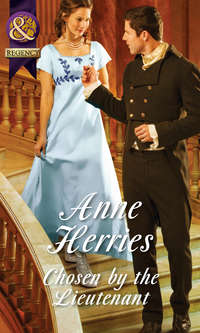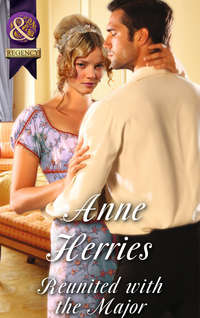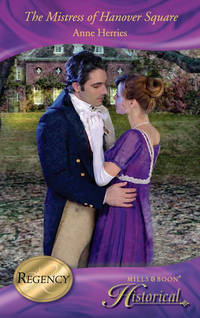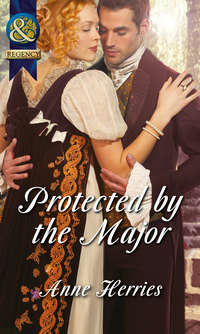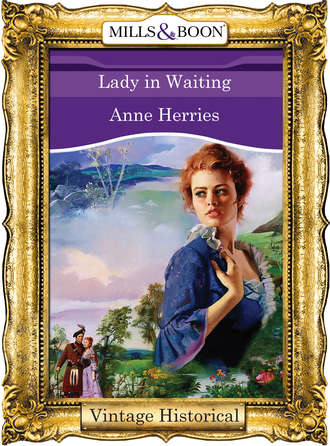
Полная версия
Lady in Waiting
There was, however, to be no such delay. Their smiling hostess greeted them with a hearty breakfast of coddled eggs and fresh muffins to eat with her own honey—and the news that the carriage was repaired and awaited their pleasure.
‘We must thank you for your kindness,’ Lady Stamford said. ‘Should you ever wish to be presented at court you must call on me to help you.’
‘Lord bless us, ma’am, what should I find to do at court?’ Sarah went into a peal of good-natured laughter. ‘Our Nicholas can play the fine gentleman when the occasion calls for it, though I have always thought him a countryman at heart, but I am mightily content with my life here.’
‘And a very good life it is too, Mistress Middleton.’ Lady Stamford bit into a third muffin oozing with creamy butter. ‘You are fortunate in your cook, ma’am.’
‘Oh, I made those myself,’ Sarah said, and turned to Catherine. ‘So beautiful as you are, you’ll be certain to find a handsome husband at court, mistress—but make sure you choose a kind man, for in the end a peaceful, loving home is what makes a woman happy.’
‘I thank you for your good wishes, ma’am.’
Catherine wondered if Sir Nicholas would return before they left, but in the next breath Sarah told them that the men would not come home before the evening. Catherine was conscious of a feeling of disappointment; though she did not know why she should feel anything for a man she had met but briefly and would probably never meet again. He had been pleasant enough when they met in the kitchen garden, but the image of him amongst those drunken idlers remained with her.
‘Well, Catherine,’ Lady Stamford said when they were settled in their carriage having said farewell to their hostess, ‘I do hope that we shall have no more adventures on the road, fortunate as this one turned out.’
‘We were indeed fortunate, Aunt. Sarah and Mr Middleton were generous hosts.’
‘And Sir Nicholas.’ Lady Stamford looked at her hard. ‘I hope you will be more disposed to greet him kindly should he decide to call upon us in London.’
‘I was not aware he was intending to visit London.’
Catherine’s heart had begun to throb rather oddly as she waited for her aunt’s reply. It was most unaccountable! Why should she be so affected by the rogue?
‘Indeed yes. Mistress Middleton told me that the Queen’s most trusted adviser had summoned him there. Sir Nicholas was named for his father, who was a friend to Cecil. Unfortunately, the father died some three years back, having never quite recovered from a lingering illness he contracted while a prisoner in the Tower for some months during Mary’s reign, and then the untimely death of his eldest son, Harry. It was because of that friendship between Cecil and Sir Nicholas’s father that he may have a brilliant future open to him at court.’
Catherine wrinkled her brow in thought. ‘Do you think Sir Nicholas an ambitious man, Aunt?’
‘All men of sense are ambitious.’
Lady Stamford had settled into her corner, cushions at her back and a rug over her lap. She closed her eyes, leaving Catherine to stare out of the window at the countryside. Some of the land to either side of the high road was commons and grazed by animals belonging to village folk, but more often now enclosure was encroaching on land that had once been open to all. The walls of large estates had altered ancient boundaries, often causing hardship to the poor.
‘It is so unfair,’ Catherine had complained to her father when one of their neighbours took away a stretch of land that had previously been common land. ‘He has so much, and they have so little.’
‘It is the fault of rising prices,’ Sir William explained. ‘Land owners can get no more rent for the land they have let to tenants for years past, but they must find more coin for everything they buy. Therefore, they must take more land into enclosure, and if they have title to it…the right is theirs.’
Put like that, Catherine could understand why some landowners felt justified in enclosing land, but she knew that their actions caused much suffering for others.
Were the Middletons like other farming gentry and forced to take land that had once been free for all? They had seemed prosperous to Catherine—and judging by the supper talk the previous evening, Sir Nicholas was a man of some substance.
Catherine’s thoughts returned once more to the man who had rescued them the previous afternoon. Why could she not dismiss the incident from her mind? It mattered not if he thought her a cold, mannerless wretch. As indeed she had been the previous afternoon and evening, though she had tried to be more conciliatory in the garden—at least until he had looked at her so oddly.
He was charming, but undoubtedly an ambitious rogue and it would be better for her peace of mind if she instantly forgot him, as no doubt he had already forgotten her.
‘What think you?’ Matthew looked at his brother-in-law as they surveyed the stretch of good land by the river. ‘It has always belonged to my family, but we thought it well to keep it as it is, a pretty stretch of sweet grass that all may graze. In summer I may have a few sheep here myself, though ’tis oft flooded in winter.’
Nick’s eyes were serious as they rested on the strong, rather craggy features of Sarah’s husband. It had been a good match for his sister, one that he had approved soon after his father’s death. He knew Matthew to be a good man and understood he was troubled by his conscience. He had waited for Nick’s return before making any decision, simply because he found it a thorny problem.
‘You have the right to erect your fences,’ Nick said, knowing that Matthew would be guided by his opinion. ‘But it will cause hardship for the villagers.’
‘Aye, I know it,’ Matthew replied heavily. ‘It goes against the grain with me, but I need more land under cultivation…’
‘Why not take that piece of scrub to the north border?’ Nick suggested. ‘It will need more work to bring it round, but you may call upon the village folk to help you. Make it clear that you need more land and ask for their help in preparing the scrub in return for keeping this wash open for all.’
The frown cleared from Matthew’s brow and he smiled in gratitude. ‘Aye, I’ll do it. I’ve not asked for the accustomed days in labour for many a year, for we all pay in coin these days—but I’ll take the labour in lieu of the land, and all may be satisfied. Sarah told me to consult you, and as usual she was right.’
‘My sister flourishes,’ Nick replied with a soft chuckle, affection and warmth in his eyes. He was fond of Sarah and she of him. ‘You have spoiled her and yet she is less fiery than of yore. Tell me, what kind of magic have you used to tame her?’
‘’Tis love, nothing more,’ Matthew answered with a smile. ‘Speaking of fiery wenches…what of Mistress Moor? Think you she was an uncommon beauty? That red hair and those eyes, and the whiteness of that skin…such a woman might tempt any man to madness.’
‘Do not let Sarah hear you,’ Nick warned, his eyes full of wicked laughter. ‘She will take a broom to you, I swear! But you are right, Matthew, Catherine Moor is a beauty, though she seemed overly proud and a little cold to me.’
‘Cold?’ Matthew raised his brows incredulously. ‘No, Brother, you cannot be serious? I would swear there was fire simmering beneath the ice. She has a haughty bearing I’ll grant you, but that is but a façade I dare swear. I vow it would be entertaining to see what lies beneath that cool manner, and would be tempted to probe for it right lustily were I not a married man.’
‘I’ll admit that a wench of that ilk is tempting to any man,’ Nicholas said, a smile on his lips as he remembered the way Mistress Catherine had glared at him. Even in the garden she had still seemed reserved and cool, though she had blushed when he first caught her amongst the herbs. It was probably true that there was fire beneath the ice, and in other circumstances he might have been tempted to breach the walls of the citadel, for he was a man of lusty habits and had taken his first wench when but fourteen in the hayloft of his home. Unfortunately, he had other more important matters on his mind and could not spare the time for dalliance.
‘When do you leave for London?’ Matthew asked as they remounted their horses, setting out to inspect further pastures that Matthew had a mind to plough up and put down to grain that year. The export of wool was frowned on these days, and the call was for more grain to keep down the price of bread, which like everything else had been rising of late. ‘Sarah is hoping you will stay a while.’
‘A few days at least,’ Nicholas replied. ‘I must be in town within a fortnight, but I have someone else I would wish to see first and it will take me some days to ride to Leicester and back. I may go tomorrow, then join you at the weekend again for a couple of days before I go on to London.’
‘You know your business best,’ Matthew said. ‘Sarah wishes you would marry and settle down, but I’ve told her you’ll find your own way when you’re ready. But we’ll say no more on the subject, for I see it vexes you.’
Nick was frowning to himself as his companion fell silent. He would have liked to confide in Matthew, for he was a good man and true to his principles, but in knowledge lay danger and Nick would not involve his sister’s husband in this.
There were but few men he would trust with the problem that was taxing his mind. The court was alive with intrigue, and one could never be sure where others stood. This business of Norfolk had seemed settled after the failure of the Northern Earls in their uprising of November 1569. The Queen, reluctant to punish her cousin, had allowed him at least partial freedom—but there was treachery afoot, and if it were not for the vigilance of men like Francis Walsingham and Sir William Cecil England might even now be at war with a foreign invader.
Nicholas’s business in London was important but not urgent. There was time enough for him to speak to the man he trusted most outside his family. Oliver Woodville was his late brother’s closest friend, and the man who had brought them the news of Harry’s death. He had broken the news first through a letter and then had come in person on his return to England.
Oliver had been very distressed by Harry’s death, but though he assured the family that it had been caused by a common fever, which affected many travellers, Nicholas had always retained a faint suspicion that Oliver himself was not convinced. Or perhaps it was merely Nicholas who refused to be convinced, because his grief was too terrible to bear, his sense of loss too deep for a younger brother to accept. However, his reason for seeking Oliver out was only partially to do with his brother’s death all those years ago; he had other concerns that nibbled at his mind, troubling him with a half-forgotten memory. More pressing perhaps was his secret work for Walsingham.
The Italian banker Ridolfi had most certainly been behind this latest plot, but was there also another hand involved? Walsingham was uncertain, though he suspected something…something hidden beneath the layers of intrigue and deceit.
‘Ridolfi would seem the prime mover in this plot, for it is certain Norfolk hath not the stomach for it,’ Walsingham had told Nick privately in Paris at their last meeting. ‘Had he grasped the nettle in ’sixty-nine he might have raised the country and swept Elizabeth from the throne. There is much love for Norfolk, amongst commoners and nobles alike. Even Cecil likes the man, though they be on opposite sides in this matter, but he would not see him dead, and Her Majesty protects him. I believe him dangerous but not the prime mover in these plots.’
‘But once his true perfidy is proven? Surely Her Majesty will see he is a traitor and must be dealt with as such?’
‘As yet the final pieces have still to be found,’ Walsingham had told him. ‘We know much, but Her Majesty is no weakling to be directed against her will in this. She asks for absolute proof of his guilt and will not return Norfolk to the Tower until we have it.’
Nick nodded, looking thoughtful. He knew well that Elizabeth was made of stubborn material, and given now and then to sudden rages like her father. Despite gossip and the harm done by malicious tongues that had slandered Anne Boleyn, there was no doubt in those closest to Her Majesty that King Henry VIII had fathered the courageous, determined lady many called Gloriana.
But this was not the problem that Walsingham was currently trying to grasp. Nick looked at him for a moment, trying to fathom the working of this clever mind. ‘And you think there is still another traitor involved in this plot—someone we do not yet know?’
‘I sense him…smell him,’ Walsingham declared. ‘There is the stench of evil about him, Nick, but I cannot name him. Nor can I say for sure that he exists outside my imagination.’ He shook his head sorrowfully. ‘I have my suspicions of John Dee, but he is Her Majesty’s astrologer and trusted by her. I do not like the man and think him a bad influence on the Queen, but without proof my hands are tied.’
‘You think Her Majesty’s astrologer may be involved in some plot against her? Surely not?’
‘Some writings came to my hand, from Dee to a man who had sought his advice on workings of the occult. There was nothing of treachery in them, but something…’ He shook his head. ‘I do not trust the man nor any that treat with him.’
‘But you have no proof,’ Nick asked and Walsingham shook his head. ‘Nay, I need not ask, for you would have moved against him had the evidence been in your hands.’
‘In my business I glean crumbs from time to time and in this way my bread is baked. If the man be in league with the Devil I shall find him out one day.’
Absolute proof was hard to find and must be sought thread by thread until the tapestry was complete. And that would be all the harder if, as Nick suspected, he himself had been followed to and from his last meeting with Walsingham. Could their conversation have been overheard—and who was the man he had caught a glimpse of in the shadows?
He could not be certain. Indeed, he had seen the man in the shadows only briefly as they walked together in the gardens of Walsingham’s house at dusk. That brief sighting had touched a chord in his memory when he recalled it later, taking him back to a time when he had been much younger. Yet was it possible? It seemed unlikely. He was most probably mistaken; it had more likely been a trick of the light or a face long forgotten remembered wrongly, but it would do no harm to ask Oliver for a name.
The remainder of Catherine and Lady Stamford’s journey to town was uneventful, though they had to accomplish it without the baggage coach, which having somehow missed them on the road had continued on to London and awaited them at Lady Stamford’s town house.
The house, situated just off St James’s and convenient for the Palace of Whitehall, which was the Queen’s main residence in London, although she had many other palaces within a short distance, was a tall, narrow building with overhanging windows and a timbered frame.
Catherine was surprised at the closeness of the houses through which they passed on their way to Lady Stamford’s home. The streets were filthy and the smell that came from the rubbish-strewn gutters indescribably foul. She had expected her aunt’s house to be larger, but Lady Stamford explained that as she came to town only occasionally she did not need anything grand.
‘We shall be out most of the time, and I do not entertain lavishly in town, merely a supper or two if I feel inclined to invite close friends. Indeed, if it were not for Willis I might be tempted to sell it altogether. My second husband, who had ambitions at court, bought the house as a gift for me. Unfortunately, he caught the pox and died before he had a chance to make his name. And then of course I married again, and when the young king was taken from us my husband felt it prudent to retire to the country. We did not come to town again for a long time.’
Many Protestant ladies and gentlemen had done as much during the reign of the Queen some named Bloody Mary. It had been safer and more prudent so.
The London house had been reopened after Elizabeth came to the throne amongst scenes of rejoicing by the common folk, Lady Stamford having attended the Coronation and been present in the Abbey. Her third husband had unfortunately died soon after of a putrid fever, and once again she had retired to her house in Berkshire. Now she had returned to London for Catherine’s benefit.
Inside, the furnishings were good solid oak, some of it worn to a mellow softness by time and wear. The unwarranted use of English oak for anything but shipbuilding was frowned on these days, because it had been over-used, and imported woods were beginning to take its place, walnut being a favourite for good furniture. However, there were rich hangings on the walls and a set of six beautifully carved elbow chairs with padded backs covered in a bright tapestry. The stuffed backs made them more comfortable than any Catherine had ever used before and she remarked on it to her aunt.
‘They were a special present to me from my third husband for our wedding,’ she told Catherine. ‘He asked me what would please me most and I told him of chairs I had seen in Her Majesty’s bedchamber so he commissioned these for me. I liked them better than any jewel, and they have given me ease on many a weary night. There were ten of them in all but I gave four to Margaret when she married Willis, and I shall give you two as a wedding gift.’
‘They are indeed most handsome,’ Catherine said and thanked her.
She must be grateful for her aunt’s consideration. Such chairs were seldom found in even the best houses, and it was a generous gesture to give such a valuable gift. Clearly her aunt expected her to make a good marriage and Catherine hoped she would not be too angry if her plans came to naught.
The scolding she had received after her coldness to Sir Nicholas had chastened her and she had found herself quite unable to put the incident from her mind. But now that they were in London, she imagined it would be easier for there was so much to see and do.
Lady Stamford had talked constantly of the silk merchants they would visit, and over the next several days Catherine was shown a dazzling display of wonderful silks and velvets. So many that she found it difficult to choose and spent an enormous amount of her father’s money.
‘My brother can well afford it,’ Lady Stamford told her when she wondered what he would say at their extravagance. ‘And you cannot go to court looking like a pauper.’
The merchants’ shops had signs hanging above them, often brightly painted and in many cases depicting the nature of their trade or guild; they swung backwards and forwards in the wind, making a creaking noise and adding to the general hubbub. The market stalls abounded everywhere, crowding the narrow streets; meat, fish and vegetables were open to the elements and flies in the heat of the day, and sometimes the smell was enough to make Catherine retch.
At home she would have ridden to a local market or fair, but in London they found it more convenient to summon a chair to carry them about the city. Walking was out of the question, because the gutters were choked with filth and one had to watch for housewives throwing the contents of their chamberpots from an upstairs window with only a brief warning, which caught many unawares. She had seen more than one fine gentleman raise his fist in anger when slops splashed his hose or trunks, as he was slow to dodge the deluge from above.
It was often almost impossible to pass through the narrow, congested streets, which quickly became choked with the press of traffic. Sitting behind an overturned wagon that had spilled its load on the ground did not find favour with Lady Stamford, and the best chairmen were adept at avoiding such disasters.
Catherine was in turn delighted and appalled by the sprawling city, which had spread out beyond its medieval walls, despoiling the countryside about it. The ditch outside those walls, which had once been a part of the city’s defences, had become a narrow, silted channel that stank in summer and had been built over in places. However, the curving banks of the Thames were still green and pleasant in many areas, gentle, spreading trees gracing them with their tranquil beauty, and flocks of swans frequenting the clear water. Within the city itself it was possible to come upon orchards secreted behind walls or pretty private gardens, and the houses of the rich were sometimes very grand, often situated close by the river with long sloping gardens to the rear. Catherine thought how pleasant it would be to walk there on a warm evening, and regretted that her aunt’s house had only a small walled courtyard.
The streets of the city were mostly dark at night, though lanterns hung outside the better houses and inns. It was, however, a risk to venture out late at night, despite the efforts of the watchmen.
‘We shall be well escorted if we go out in the evenings,’ Lady Stamford told her niece. ‘But we must wait until your father arrives before we go to court.’
In the meantime Catherine was content to be taken about the city, visiting the newly opened Royal Exchange, the beautiful parks, so many shops that her head went spinning at all the frills and trinkets she was shown. What she enjoyed most was being rowed down the river on a pleasant day to watch some sport or a play given in the courtyard of a superior inn.
Catherine was pleased to discover that the particular players she was taken to watch were under the protection of the Earl of Leicester, and vastly more talented than those she had seen on her way to London. While watching them she recalled the young Kit Marlowe, and thought he might have liked to be present for the performance. The behaviour of the audience, which was made up of richly dressed ladies and gentlemen, was better than that she had witnessed on the road, but there was still a rowdy element who called out occasionally, using the poor players as the butt of their wit.
‘It is always so at a public performance,’ Lady Stamford told her. ‘But you will see better manners at court.’
Catherine found herself looking about the audience. She scolded herself for her disappointment at not seeing the person she sought. How foolish she was! Sir Nicholas was undoubtedly still in the country with his sister. Besides, why should it matter to her? She would do best to put him from her mind!
It was as they were being rowed back up river that Catherine saw the heads on spikes outside Traitor’s Gate and shuddered. Public executions were not uncommon, and she had been forced to witness a hanging when on her way to a certain silk merchant Lady Stamford had praised for the quality of his wares, their chairmen having been unable to make a way through the press of the crowd. However, the sight of blackened heads left to rot and be pecked at by the crows was one she would rather not have seen.
‘You must accustom yourself to such things and learn to ignore them,’ her aunt told her with a frown when she spoke of the barbaric behaviour of some in the crowd at the hanging. ‘Those men were enemies of the state and must be punished. After the attempted uprising in ’sixty-nine Her Majesty’s advisers are determined that this latest plot shall come to nothing, and she must be protected from those who would harm her.’
Catherine nodded, knowing her aunt spoke the truth, but the sight had cast a shadow over the afternoon and she was conscious of coldness at the back of her neck. The unease between Catholic and Protestant was a source of constant tension in England, and seeing those blackened heads upon spikes she could not help but feel sorry for the men who had died such a cruel death and for their families, who would naturally suffer grief and deprivation.
It was at moments like this that she longed for the peace of the countryside and wished that she might be back at home with her father.
However, her mood was soon altered, for when they entered her aunt’s house it was to find a bustle and a stir that could mean only one thing.


